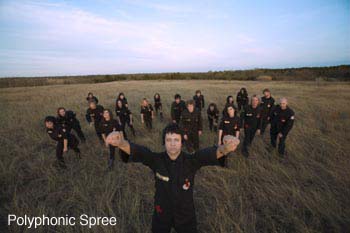The Polyphonic Spree interview
The Polyphonic Spree
Trouble In Paradise

Darting out of a youth orchestra performance at the Louisiana Children’s Museum on a Tuesday afternoon to speak with IE, Julie Doyle gives off the air of any other mom taking her kids (four to be exact, ranging from 6-months to 8-years-old) on a summer vacation outing. Except, of course, Doyle’s job dictates anything but the role of the average maternal figure. As co-leader of the Dallas-based collective known as The Polyphonic Spree, along with husband and frontman Tim DeLaughter, Doyle plays den mother to the band’s other 21 members.
Appearing: August 4th at Lollapalooza in Chicago.
“A day at a time. One step at a time,” Doyle says, explaining how she juggles her ever-expanding musical family and the littlest members of the Spree’s posse. “It’s pretty crazy, but it works. I think it sounds a lot scarier than it really is.”
While scary fails to remotely describe the band, when The Polyphonic Spree first gained notoriety shortly after forming in 2000, many were bewildered by their size and outward appearance. Known for über-cheerful live performances and a predilection for donning white and then multicolored flowing robes, headlines jokingly referred to them as a cult, snidely making Kool-Aid references.
“It was funny for awhile,” Doyle admits. “It does get old because there’s so many talented people involved in the group that really are quite passionate and really care about what they’re doing musically.”
Ironically, Doyle says the robes were introduced to eliminate the distraction street clothes created and also as a canvas for projected images to marry a visual aesthetic along with the sonic. Suddenly, it became all about the robes.
“For whatever reason, the robes blew people’s minds,” Doyle says. “The robes, at one point, were somewhat of a detractor, but we’re kind of beyond it.”
That’s the truth. After a three-year gap between albums, the Spree announced their reemergence with The Fragile Army (TVT) and quite a different look. Eschewing those oft-debated robes, DeLaughter and co. appear on the album’s cover in matching black military-style wear. According to the band’s press materials the new uniforms carry “universal symbols of peace”: a heart emblazoned on the left shirt pocket, a silk-screened image of the band wearing their white robes on the right, a red cross patched on the right hip pocket, and a gold nameplate identifying each member.
“With The Polyphonic Spree, it’s always about unification. It will never totally be about one style of garment. We’ve done the robes and when we came back, it just felt like it was time to add on that other perspective,” Doyle says. “What we’re wearing now is sort of non-descript. So it’s kind of good because we’re kind of accomplishing, at this point, both things. The unification, without it pigeonholing us into one thing.”
Recorded in Minnesota, Dallas, and even Steve Albini’s Electrical Audio in Chicago, The Fragile Army retains the Spree’s penchant for over-the-top bombast, as only a band with a harp, French horn, nine-member choir, and even a tap dancer can.
The songs are still sunny, but they refrain from outward worship of that great big ball of fire in the sky, unlike the Spree’s last two outings (The Beginning Stages Of . . . The Polyphonic Spree and Together We’re Heavy). Yet with the cherubic DeLaughter at the helm, the band reach toward the heavens with self-help mantras set to orchestration, which would veer towards kitsch if not for the conviction with which the all-around “shiny happy people” mentality courses through the album’s 10 tracks.
Despite the Disney World-size sense of wonderment, for the first time some of the lyrics hint at an unrest and weariness pertaining to the country’s current political climate. The title track, Doyle says, came to the forefront as the realities of the world seeped in — the band was on break and away from the life in a bubble that touring perpetuates.
“We feel pretty strongly about what’s been going on and I think it crept into several of the songs, whereas several of the songs are still along the idea of love and hope and things that if you dare to talk about these days — people don’t get it,” Doyle explains. “It is so much easier to be angry and to express angst. But there’s a lot of fake angst out there as well, so this record hopefully has several colors.”
Daring anyone to say they’ve left a Spree show in anything but a state of euphoria is like asking someone if they prefer Chicago’s winters. The high may wear off on the walk back to the parking lot and is sadly irreproducible on record, but the time span between the whole lot taking the stage and leaving is worth every penny. Shaking off work, the argument waiting to resume upon arrival back at home, dissatisfaction with a lover — all seem manageable while basking in the glow of the Spree and DeLaughter’s welcoming, outstretched arms. At least that’s how Doyle sees it.
— Janine Schaults
To hear Doyle’s take on the happy tag, grab the August issue of Illinois Entertainer, available for free throughout Chicagoland.









